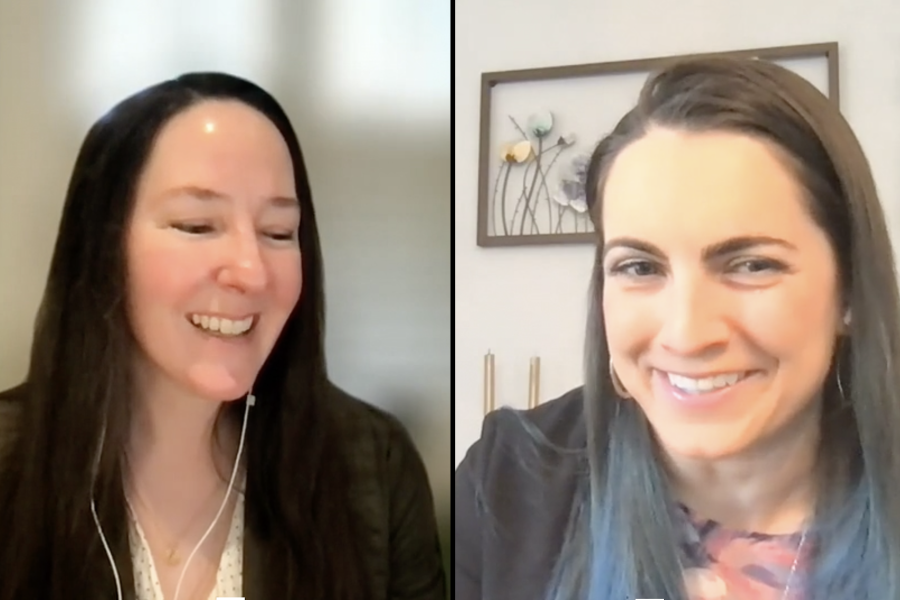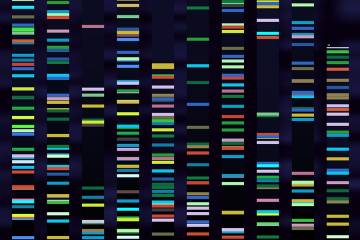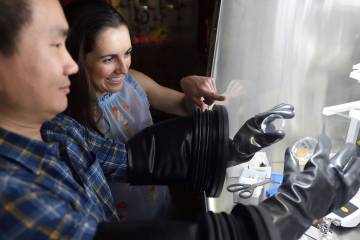Two Johns Hopkins faculty members have received the university's prestigious President's Frontier Award, which recognizes exceptional scholars who are on the cusp of transforming their respective fields.
In a surprise virtual presentation Monday, JHU President Ron Daniels presented the award to Alexis Battle, an associate professor in the Department of Biomedical Engineering, and Sarah Hörst, an associate professor in the Department of Earth and Planetary Sciences. Both researchers will receive $250,000 to pursue new lines of research, expand their laboratories, or support their lab members.
"Let me take this moment to say how dazzled we were, Alexis and Sarah, by the ambitions and scope of your research and how highly your colleagues, mentors, and students regard each of you," said Daniels in the virtual presentation. "Having a way to honor those qualities in our faculty was a reason why we created this amazing award eight years ago. … You both join a cadre of truly remarkable people from across all our divisions whose work truly stands apart."
The President's Frontier Award was originally launched with a commitment of $2.5 million from trustee Louis J. Forster, A&S '82, SAIS '83, and is now paired with a $1 million donation from alumnus David Smilow, A&S '84. Winners have spanned the university's divisions and included molecular biologist Andrew Holland (2021), mathematician Emily Riehl (2020), astrophysicist Brice Ménard (2019), nephrologist and epidemiologist Deidra Crews (2018), composer Michael Hersch (2017), molecular biologist Scott Bailey (2016), and stem cell research Sharon Gerecht (2015).
The award typically recognizes one winner and one finalist each year, but Battle and Hörst were both selected this year based on the strength of their applications and the demonstrated impact and continued potential of their work.
"The two of you embody in some sense the incredible breadth of research that goes on at JHU," said Ed Schlesinger, dean of the Whiting School of Engineering. "From the very smallest genetic materials that define what life is all about to the planets, space, the cosmos, and the search for life beyond our own world—there is something particularly poetic about the juxtaposition of both of [your work]."
During the presentation, both Battle and Hörst discussed the transformative impact the award would have on their research teams.
"Last night and today, I was thinking, What do I really want to do if I get this award? And I was really laying out some of the exciting things that I'm hoping will happen over the next few years," Battle said. "So that makes me even more excited now, to know those things are going to be possible. I'm so thrilled, and I'm thrilled to see my students thrive even more."
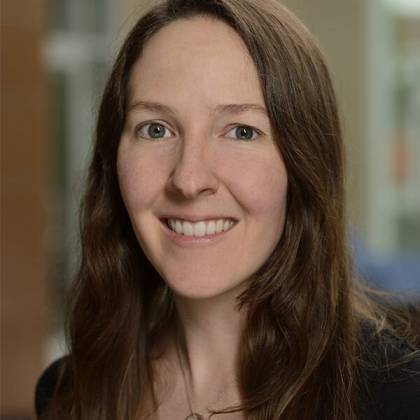
Image caption: Alexis Battle
Image credit: Will Kirk / Johns Hopkins University
Battle is an internationally recognized leader in the field of biomedical engineering whose work has vital implications in the fields of human genetics, computational genomics, and precision medicine. Her research focuses on how genetic variation between individuals leads to changes in gene expression, and how these changes then lead to disease risk and progression. Using machine learning and probabilistic modeling, Battle and her lab create computational models capable of interpreting vast sets of genomics and health data to identify variations in gene expression and follow trends in disease progression caused by these changes in DNA. She has pioneered the use of time-series data to understand the impact of genetic variation at critical time points relevant to disease development.
Her breakthrough computational system, Watershed, holds great promise in the field of personalized genomics. Watershed's advanced modeling system combines personal genetic data and diverse cellular measurements to improve predictions of which genetic sequence differences found in a specific individual will affect that person's health. Applying this system across ancestries, families, and new data types has the potential to improve the diagnosis and treatment of rare diseases.
"There is increasing need for creative computational methods in genomics," wrote Michael Miller, director of the Department of Biomedical Engineering, in a letter nominating Battle for the President's Frontier Award. "…Seeing the full impact of genomic data on biological and medical research therefore relies on the type of creative and careful methods development Alexis does."
Battle was a senior leader on the GTEx Consortium Project, a massive multi-institution effort that collected and analyzed thousands of human tissue samples to better understand gene expression. With dozens of principal investigators on studies related to the project, Battle's lab played a central role and she served as a senior author on the project's flagship papers.
Educated at Stanford University, Battle received her BS in symbolics systems and her MS and PhD in computer science. She completed a postdoctoral research specialization in genetics at the Howard Hughes Medical Institute at Stanford. She joined the faculty at Johns Hopkins in 2014 after working as a staff software engineer and engineering manager at Google. She has previously won a Johns Hopkins Catalyst Award (2017), which recognizes early career researchers with a $75,000 grant for their research and creative endeavors, and a Johns Hopkins Discovery Award (2019), which provide grants to cross-divisional teams. She was named a 2016 Searle Scholar and received a 2019 Microsoft Investigator Fellowship. She currently mentors four postdoctoral fellows, one medical fellow, 11 PhD students, and serves as an adviser for three undergraduates in the Department of Biomedical Engineering.
Hörst, a planetary scientist, studies the composition and characteristics of aerosols in the atmospheres of early Earth and other planets. Using laboratory experiments, modeling, and remote sensing and in situ measurements of atmospheric chemistry, Hörst and her lab work to understand how small molecules transition to become aerosols and the resulting physical and chemical properties of those particles.
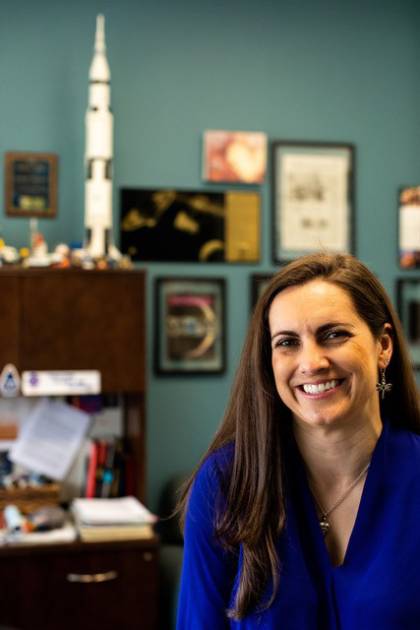
Image caption: Sarah Hörst
The work has implications for assessing the habitability of other planets and for the search for life beyond our solar system. Under the right conditions, adding energy to simple mixtures of common gases can produce much more complex molecules like amino acids, which form the building blocks of living organisms.
Essential to her work is her groundbreaking approach to laboratory science. Using a custom-built Planetary Haze Research lab—a one-of-its-kind experimental lab—Hörst and her group simulate the chemical reactions that contribute to the formation of aerosols in planetary atmospheres. With this approach, she can experiment with a vast range of temperatures (90-800 degrees Kelvin, or -297-980 degrees Fahrenheit) and can use different energy sources to initiate chemical reactions across a variety of atmospheric gases and conditions. Her lab is the first in the world to be dedicated to studying photochemical haze production in exoplanet environments, and she has published research on Saturn, Saturn's moon Titan, and early Earth.
Hörst's work is directly relevant to important space missions, including two upcoming NASA missions: Dragonfly, which will investigate prebiotic organic chemistry and habitability on Saturn's largest moon, Titan; and DAVINCI+, which will probe the chemical composition of the atmosphere of Venus.
"Particularly impressive is her ingenuity and creativity in developing and leading a new scientific field essentially from scratch: extrasolar planet atmosphere laboratory studies," wrote Sabine Stanley, a Bloomberg Distinguished Professor and chair of the Department of Earth and Planetary Sciences, in a letter nominating Hörst for the award. "Her work has already had major impact on the global effort to observe and characterize exoplanet atmospheres."
She received the 2020 LAD Early Career Award from the American Astronomical Society's Laboratory Astrophysics Division and the prestigious 2020 James B. Macelwane Medal from the American Geophysical Union, widely considered the highest honor for early career scientists in the field of geological and planetary sciences. She received a Johns Hopkins Catalyst Award in 2017 and was a co-investigator on a Discovery Award led by Maya Gomes in 2020.
Hörst received two bachelor of science degrees—one in planetary science and one in literature—from the California Institute of Technology. She received her PhD in planetary sciences from the University of Arizona, Tucson. She joined Johns Hopkins in 2014 and currently mentors three graduate students, two postdoctoral research fellows, and an associate research scientist.
Chris Celenza, dean of the Krieger School of Arts and Sciences, gave Hörst particular praise for her emphasis on mentorship and collegiality.
"I often think that we are at our best in the arts and sciences when we're reciprocally reinforcing conversations among faculty, postdocs, graduate students, and undergraduates," Celenza said during the award presentation. "I know in your lab, you've cultivated that very type of engagement, so I want to thank you, deeply, for all you have done for this wonderful Department of Earth and Planetary Sciences and for Johns Hopkins and for the Krieger School."
Hörst's dedication to her lab members was evident from the moment they "Zoom bombed" the meeting, joining in on the coordinated surprise. "When I saw the names popping up on the screen, all I could think was how much more great science the people who are already working with me are going to get to do," Hörst said through tears. "And that means the absolute world to me."




